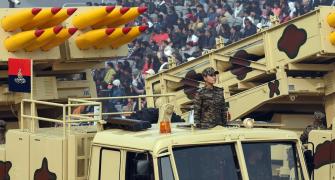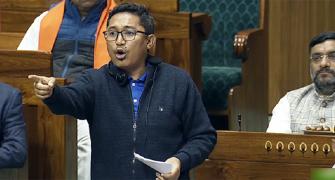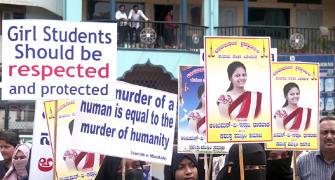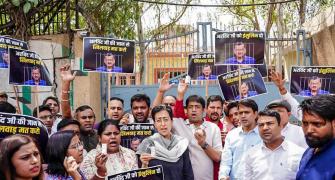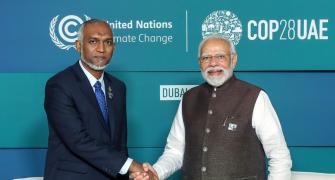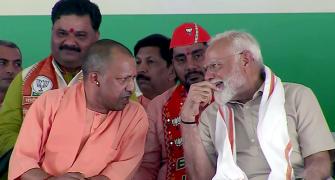 H Rayudu Koka, the chief of Ontario's physicians body discusses with rediff.com's Ajit Jain what the province and Canada are doing to enable international medical graduates to practice medicine there.
H Rayudu Koka, the chief of Ontario's physicians body discusses with rediff.com's Ajit Jain what the province and Canada are doing to enable international medical graduates to practice medicine there.
About 700 international medical graduates, including a large number of South Asians, are unable to practice medicine in Canada because their credentials are not recognized in this country. Many of them are driving cabs, says Dr Joseph Kurian, one of the founders of the Canadian Association of Physicians and Dentists of Indian Heritage.
At this year's annual conference of the CAPIH September 25 to 27, the main topic of discussion was IMGs. The keynote speaker was Dr H Rayudu Koka, president, College of Physicians and Surgeons of Ontario the licensing body for physicians to practice medicine in the province.
Koka told rediff.com in an interview that the regulatory body has broken down barriersand continues to do sofor International medical graduatess to practice medicine in Canada, "but we can't lower the standards of medical practice."
About 700 international medical graduates in Canada don't have license to practice medicine.
The Council (of the College of Physicians and Surgeons of Ontario) sets up medical standards to license physicians, investigating and disciplining the license physicians as well. Public members are in each committee of the Council as public input is very important and in the College Council there are about 13 to 15 public members appointed by the lieutenant governor of Ontario. There are also 19 voting physician members of the Council. We have been concerned about human resources, and we have different ways the IMGs can get license to practice in Ontario.
One is the assistant professor [scheme] under which any medical graduate from anywhere in the world, if they have postgraduate qualifications and have been recruited by any medical school in the province as assistant professor, will get an academic license as assistant professor straightaway. Some medical school has to offer them a job. That way, many people are coming. That way, they have their license to practice medicine and teach in the medical school. They practice medicine in the same manner as a locally trained assistant professor of their specialty. This policy was not there before. We also have registration through practice ready assessment for those who are trained in England and Ireland and other countries. Their training levels will be assessed and they will be able to go into private practice after six months or they might need up to two years of training, which was not the case before.
They could be from any areas of the world as long as they are assessed for training and passed some screening test. And for this they are assessed in the university setting, and then after that they will be under observation. And after six months if his mentor says he's qualified, he will get the license. There are many IMGs who within six months get the green signal and are able to get the license to practice in Ontario.
Many need six months observations and they get their license. For others, it could be up to two years. It also depends on the availability of spaces in five medical colleges in Ontario. They have limited spaces for IMGs observation training. They have to wait for the space to become available. Those who are practicing medicine in the US and have done so for a minimum of five years, we send our inspectors to test them and they too can come to Ontario and get their license.
How then are 700 IMGs still unable to practice medicine?
The IMGs can compete in the process provided they meet the requirements to get into this residency training program. Before, they couldn't apply until the second round and the third round of residency program competition. Moreover, some have limitations in their knowledge and skills. Different countries have different standards. If they are good they will get in. There's no discrimination whatsoever.
As president of the CPSO, why do you think these complaints are still coming?
We have no control as to who gets in and how many seats there are. Anybody who has offer for resident in training, we give them an education license. As long as they have an offer for training, we will give them the license accordingly. For example, in 1997, 481 IMG certificates, including educational certificates and independent licenses, were issued. Last year we gave 1,500 total for IMGs, of which independent licenses were 393. In 2000, only 107 such licenses were issued. In 2008, we gave 393 licenses.
So many people have come. Everybody wants to get into the system but they have to meet the requirements and meet the standards. We now have so many pathways for us to manage these IMGs to get in. At the same time, our interest is public interest. Our interest and mandate is public safety. I don't think in Ontario or anywhere, anybody who's not up to our standards will be given license. We have some cases like in Saskatchewan some pathologists and radiologist, their reports have been questioned and mistakes have happened. We can't allow that to happen. What we have done is to maintain standards but take down the barriers. That means people can come into Ontario and practice medicine but we can't compromise on our standards.
Critics say that maintaining standards is an excuse. That these same IMGs had treated patients in their respective countries.
In fact within the country, other colleges are more rigid giving medical license to IMGs. People who claim they are up to standards, they have to prove themselves in the exams and while they are under observations. Some basic tests and assessments and that's all.
Every country doesn't have the same standards. They don't have vigilance in regard to the standards of practice, maintaining standards, etc. Not every country has the same standards as in Ontario.
After my speech at the CAPIH, there were not many questions. I told them we will soon come with the national standards across the country single standards, single sort of requirement across the country. All provinces will pass the law. Our government has introduced the legislation and second reading has already been done. It will happen across the country. Any person licensed to practice his regulated profession in one jurisdiction will be entitled to practice anywhere in the country. They will be able to move across freely. We have signed the agreement with Quebec. It is now going to happen in other provinces.
All the regulatory bodies met in June and have agreed to this and we have requested for a two-year period to implement this. Now laws have to be passed by provincial legislatures for the labor mobility bill as to how people can move from one province to another province and practice there. The law is about all professionals but we are concerned about the medical professionals. The question is how come there are different standards and different requirements for internationally qualified professionals to get their license? Why can't there be a free movement in the country?
Sadly, New Brunswick is the only medical body unwilling to agree to the national standards. It is only their college that is being stubborn but it will happen because the government is in favor of this.
What is your message for IMGs in Canada?
We have done a great deal of work for IMGs to get into the system to practice in Ontario. We welcome them, [but] they have to meet the requirements. We have lifted the barriers. At the same time, we have to maintain the standards. We are busy improving to ensure how quickly IMGs can practice medicine in Ontario. In December 2008 we introduced four pathways [www.cpso.on.ca] that make it easier for physicians to come to Ontario. Please take the exams. The College is here to help and maintain the standards but for us most important is the health and safety of Ontarians.
Image: Doctor H Rayudu Koka

